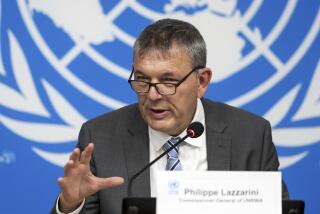Prominent female official in Afghanistan assassinated
- Share via
KABUL, Afghanistan -- Gunmen killed another female Afghan official in the latest in a series of violent attacks on women who promote women’s rights or are involved in activities outside their traditional roles here as homemakers.
The acting director for women’s affairs in the northeastern province of Laghman was shot and killed by two gunmen Monday morning as she was on her way to her office. The director, Najia Sediqqi, had been filling in for her predecessor, Hanifa Safi, who was assassinated in Laghman in July by a bomb attached to her car.
No group immediately took responsibility for Sediqqi’s murder.
The Taliban have attacked prominent Afghan women in the past, especially those involved in promoting women’s issues. Sediqqi was killed by shots from AK-27 assault rifles less than two miles from the center of the town where she worked, said Sarhadi Zowak, spokesman for the provincial governor.
Sediqqi’s death came a week after a 22-year-old student named Hanisa was shot and killed by gunmen on two motorcycles as she reported for her first day as a volunteer for a polio immunization effort in neighboring Kapisa Province. No one claimed responsibility for the attack. Afghan President Hamid Karzai ordered a high-level investigation.
Cases of “extreme or brutal violence against women” have increased in recent months, Afghan Women’s Affairs Minister Husn Banu Ghazanfar said last month. She cited more than 3,500 reported cases of violence against women in Afghanistan in the first six months of this year.
Many cases involve beatings or murders of women by family members, often for running away from arranged marriages. Other young women, including schoolgirls, have been attacked with acid or poison in attempts by the Taliban to prevent them from attending school.
The Taliban have also mounted assassination campaigns against officials of the U.S.-backed government in Kabul, focusing on provincial governors and police chiefs, who are symbols central authority. Although the government controls urban areas, many rural regions are dominated by the Taliban, who operate shadow governments and court systems.
In the latest attack on a government official, the chief of police in Nimruz Province in southwestern Afghanistan was killed Monday morning when his vehicle struck a roadside bomb while he was traveling in the western province of Herat. The explosive device that killed police chief Haji Musa Khan was planted by the Taliban, according to Abdul Hamid Hamidi, deputy police chief in Herat.
“The brutal murder of public officials has grown typical of this criminal insurgency,” said Gen. John R. Allen, commander of coalition forces in Afghanistan.
“This violence against government figures is an affront to peace and makes a mockery of any pretense of the insurgency being part of the future of Afghanistan,” Allen said. The International Security Assistance Force “stands with the brave leaders of Afghan society who will not be deterred by these violent acts. I condemn these killings and offer condolences to the family and loved ones of both of these servants of this country.”
ALSO:
South Africa’s Nelson Mandela is hospitalized for tests
British nurse who took prank “royals” call is found dead
American doctor, 3 Afghans rescued from Taliban in Afghanistan
More to Read
Sign up for Essential California
The most important California stories and recommendations in your inbox every morning.
You may occasionally receive promotional content from the Los Angeles Times.











